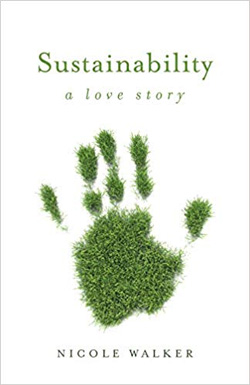By Meah McCallister
The English Department presents visiting writer Nicole Walker, reading from her work on Thursday, Oct. 17, at 7:30 in Galbreath Chapel.
Walker is an essayist, poet, and professor. She is the author of The After-Normal: Brief, Alphabetical Essays on a Changing Planet, Sustainability: A Love Story, and A Survival Guide for Life in the Ruins. Her previous books include Where the Tiny Things Are, Egg, Micrograms, Quench Your Thirst with Salt, and This Noisy Egg.
Her work has been published in Orion, Boston Review, Creative Nonfiction, Brevity, and The Normal School among other places. Additionally, she curated, with Rebecca Campbell, 7 Artists, 7 Rings—an Artist’s Game of Telephone for the Huffington Post. Walker is also a recipient of a fellowship from the National Endowment for the Arts and is noted in multiple editions of Best American Essays. Currently, she is a nonfiction editor at Diagram and Professor at Northern Arizona University in Flagstaff, Ariz.
Sustainability: A Love Story
Throughout the essays in her recent book Sustainability: A Love Story, Walker intertwines in-depth looks at her own marriage with concerns about sustainability and the environment. From the opening essay, Walker shows the reader a result of climate change— a lack of rain—while actually seeming to yearn for more than rain. She yearns for her husband, for Portland, for a sense of belonging. The image of rain is extremely effective in highlighting some of the effects of climate change, and Walker includes the requisite facts and figures about rain in Arizona.
 But this essay and all of her essays move beyond the expected argument about climate. As she relates large concerns back to her own personal situations, she shows us how we will all understand climate change in our own imperfect ways.
But this essay and all of her essays move beyond the expected argument about climate. As she relates large concerns back to her own personal situations, she shows us how we will all understand climate change in our own imperfect ways.
Walker avoids preachiness by copping to her own hypocrisy about sustainability, telling the reader the different ways humans are impacting the planet while acknowledging the ways in which she is contributing to those causes. The big picture is looped in to highlight just how unsure everyone is about how to address this dire topic. All anyone knows for sure is that something is changing and that it will be difficult to undo.
Walker, writing about personal struggle as well as global struggle, says it best when she writes, “Everything has a consequence, which makes the world, and the rain, seem so heavy.” Her essays—a radical blend of pessimism and optimism—show the different ways someone like her can balance complexities and all of the ways people like us fail as we attempt to live our lives in the midst of disaster.
Walker’s writing style is lush with metaphors that help her build her overarching arguments about the concept of sustainability. Her definition of sustainability is about maintaining a lifestyle, a self, a planet. It’s not just about the environment. It’s about how we keep ourselves together and calm and coherent when buffeted by the elements. She continuously asks herself what should be done, and what people can do.
She herself clearly states that she wants to do more, that she cares about the terrible effects of climate change she reads about, but that “doing more” is a slow, gruesome process. As a mother, wife, professor, and general human-being-with-lots-of-responsibilities, it can be incredibly difficult to sacrifice some of our ease because of a problem that seems so far away. An often humorous cry from the desert, Sustainability shows us the ambivalent, dynamic, desperate, and desperately hopeful thinking of a great writer.
“Life as green and cracked as ever”
So in a world with conflicting information (or disinformation) about climate change, what does Nicole Walker leave us with as she considers sustainability? She gives us, I think, a sense of purpose. There are little steps that everyone can make, even steps as simple as keeping the message alive. Essentially, Walker makes the argument that she will care about the climate even when the odds are bad, even when she understands the impulse to ignore or throw our hands up. And maybe, if we all care, then “Life as green and cracked as ever” will be sustainable.




















Comments